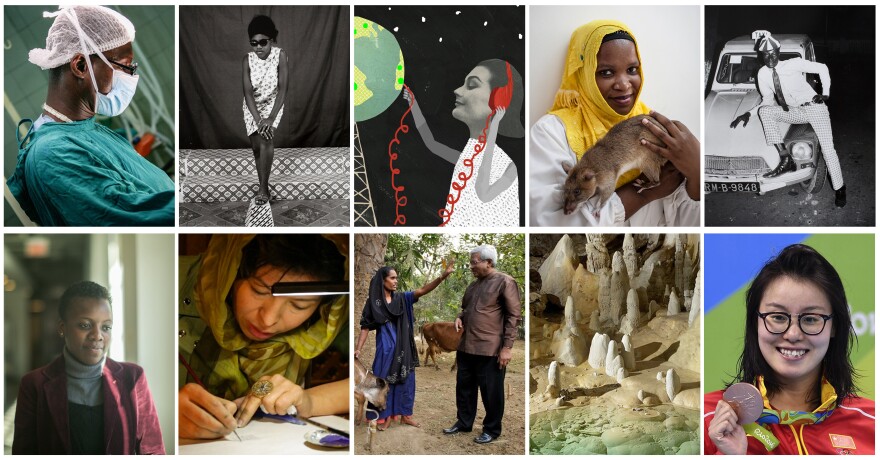There was no shortage of sad news in 2016.
And because we're a blog that covers global health and development, we covered a lot of those sobering stories: the toll of diseases like Zika, the bombing of hospitals in conflict zones, the suffering caused by poverty and by discrimination against women.
But we published a lot of hopeful stories as well. We asked our team at Goats and Soda to pick some of the stories from this year that inspired them the most. We hope you're inspired too.
Of Periods And Bugs
My favorite inspiring story from this year was about the Chinese Olympic swimmer Fu Yuanhui who made headlines for telling the world she was on her period. I love that woman — breaking boundaries and taboos effortlessly.
My favorite story that I wrote was the hero bug story. We forget that to fight antibiotic resistance we need the help of the bacteria. —Michaeleen Doucleff
A Rat With A Nose For TB
My favorite piece on Goats and Soda in 2016 was "Chewa The Lab Rat Has A Great Job, Good Retirement Benefits." African giant-pouched rats like Chewa are trained to detect TB — and they're faster and cheaper than lab machines. You can tell from the photos that the lab technicians really love their helper rats. —Malaka Gharib
Unstoppable Women
I love watching the video of Sughra Hussainy creating calligraphy. When she was a kid in Afghanistan, girls couldn't go to school. That didn't stand in her way. Today she's a gifted artist with big dreams: "I just want to work hard at this. And of course, become world famous."
A favorite story I wrote was an interview with Loyce Maturu, a 24-year-old from Zimbabwe who was an orphan, HIV positive and abused by a relative. And she had TB. And tried to kill herself at a low point. As the headline says, "She almost gave up — but didn't." —Marc Silver
Dazzling Doctor
Dr. Forster Amponsah has star power. You can see it as he walks the halls of the Koforidua Regional Hospital in Ghana. Interns' and patients' eyes track his movement. Amponsah through sheer force of will and against incredible challenges has built up a surgical department in his public hospital. The surgeries he's performing would be considered routine in a U.S. hospital but some days in Ghana they appear as small miracles. —Jason Beaubien
Irresistible Radio
Our story about Radio Garden, a website that lets you listen to stations around the world, was my favorite story. Just point your cursor at one of the thousands of green dots on a map of the globe. Listen to talk radio in Uganda, jazz in Morocco and punk rock in Hawaii. It's a fun way to feel a connection to distant cultures. —Ben de la Cruz
A Photographer And A Poverty Fighter
This one is poignant given the extremism and political violence plaguing Mali, but I felt so uplifted reading Ofeibea Quist-Arcton's tribute to the late Malian portrait photographer Malick Sidibe. His black and white images from the 1960s and '70s captured dancing couples, pensive matriarchs and youngsters showing off their grooviest outfits — a reminder of a hopeful time when Mali was newly independent and, as Quist-Arcton put it, "relishing its freedom and having fun."
One of my favorite interviews was with "the most influential poverty fighter you've never heard of" — Sir Fazle Hasan Abed, founder and head of BRAC, the anti-poverty group. BRAC helped pioneer a program that gives extremely poor families an asset like a cow or a goat. It's an approach that has likely improved the lives of millions. —Nurith Aizenman
Copyright 2021 NPR. To see more, visit https://www.npr.org.



